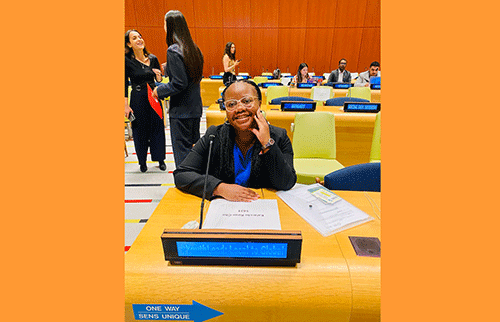At 21, youth activist Roux-Ché Kahireke has experienced the advantages as well as challenges of engaging young people. She strongly advocates active participation, particularly regarding the youth agenda.
Her efforts signify a transition from mere symbolic involvement to authentic influence, underscoring that when empowered, young people can drive policies that resonate with their lived experiences and dreams.
A social entrepreneur, she emphasised to the Economic and Social Council Youth Forum she attended in New York: “The advice and input we provide during discussions on education and youth entrepreneurship is not just symbolic; it is integrated into policies, making us feel we significantly contribute in various spaces.” Kahireke has been chosen to represent Namibia at the 2025 United Nations Economic and Social Council (Ecosoc) session to promote inclusive, evidence-based solutions for the 2030 Agenda and the Sustainable Development Goals (SDGs). She highlighted the importance of meaningful youth participation in policymaking by presenting three critical points.
The Economic and Social Council Youth Forum allows young individuals to voice their concerns and perspectives to member states and other interested parties, motivating actions and recommendations aimed at creating a fairer, more sustainable world in alignment with the 2030 Agenda and the SDGs.
The three-day event featured plenary sessions and discussions focused on advancing the 2030 Agenda, the Pact for the Future, and significant 2025 initiatives, including the Fourth International Conference on Financing for Development and WSSD2.
Kahireke added: “To ensure youth participation is genuinely impactful, it must transcend tokenism. We need co-creation spaces instead of just consultations on priority issues. We deserve a seat at the table, and a voice to express our agendas.”
She is a first-year Business Information Systems student at the International University of Management, and co-founded Light Trailblazers, an organisation focused on empowering youth in leadership, education, careers and various other global issues affecting them.
“Together with the EU and UN agencies, we launched the Youth Sounding Board in Namibia. What set this experience apart was that young individuals like me weren’t merely beneficiaries,but became policy influencers, leaders and partners,” she said.
Kahireke strongly believes for institutions to enhance youth participation, they must establish formal youth advisory structures such as councils or boards across different sectors, ensuring they facilitate continuous dialogue between policymakers and young people.
“Additionally, empowering young people by fostering their skills, self-worth and confidence is essential, especially for those from rural or marginalised backgrounds,” she said.
Kahireke stressed that institutions should engage with youth through collaboration and collective action, emphasising the importance of mutual trust and shared learning.
“It’s crucial to close the feedback loop — allow young voices to observe how their insights lead to real action. Meaningful youth participation must rest on trust, transparency and shared power, paving the way for inclusive policies that mirror the realities and aspirations of young people worldwide,” she asserted.
The Youth Forum was held from 15-17 April at the United Nations headquarters in New York. It serves as a vital platform for youth to converse with member states and other stakeholders, express their opinions and concerns, and mobilise actions and recommendations aimed at fostering a fairer, greener and more sustainable world.
-psiririka@nepc.com.na



